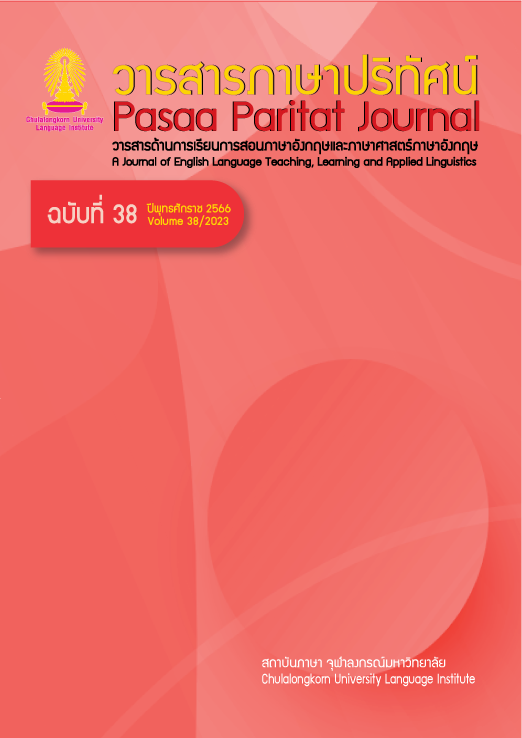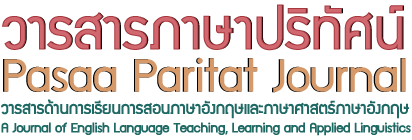One Size Doesn’t Fit All: Echoing Students and Instructors’ Voices for English Course Improvement
DOI:
https://doi.org/10.58837/CHULA.PPJ.38.1คำสำคัญ:
English Course, Fundamental English, Opinions, Course Improvementบทคัดย่อ
The primary aims of the research were, firstly, to explore first-year students’ and instructors’ opinions on the fundamental English 1 course a university in Bangkok, Thailand, and, secondly, to examine their suggestions for course improvement. The research was conducted employing both quantitative and qualitative methods. The secondary data of 3,314 responses of the first-year students from the university’s Likert-scale questionnaire survey were analysed using SPSS. Since students were allowed to write their additional comments in the questionnaire survey, thematic analysis was also used to analyse the data. In addition, semi-structured interviews with six course instructors were conducted to obtain instructors’ opinions on the course. Thematic analysis was employed for instructors’ interviews. The statistical findings revealed that overall, students held positive views of the fundamental English 1 course (Overall course information: M = 4.27, Learning Outcomes: M = 4.11, Course Objectives: M = 4.13, Instructors: M = 4.49). However, students’ comments provided greater insights of mixed views regarding the course in general, course content and materials, assessment and evaluation, and teaching and learning methods, and these opinions pose challenges for the course providers. In the same vein, the findings from the interviews with the instructors provided positive perceptions towards the course in terms of the course in general, course content and materials, assessment and evaluation, and teaching-learning methods. Useful suggestions were obtained from both students and instructors. The findings demonstrated that there is still some room for course improvement based on the opinions of these two key stakeholders. Based upon the findings, implications and suggestions for the improvement of the fundamental English 1 course are provided.
เอกสารอ้างอิง
Allan, J. (1996). Learning outcomes in higher education, Studies in Higher Education, 21(1),93–108. DOI: 10.1080/03075079612331381487
Athanases, S. Z. (1993). Adapting and tailoring lessons: Fostering teacher reflection to meet varied student needs. Teacher Education Quarterly, 71–81. Retrieved May 12, 2023 from http://www.jstor.org/stable/23475152
Beaumont, R., & Spencer, J. (2005). Learning outcomes: A practical guide. University of Newcastle Upon Tyne. Retrieved May 10, 2023 from https://www.floppybunny.org/robin/web/virtualclassroom/chap21/s1/outc7.pdf
Braun, V., Clarke, V., & Weate, P. (2016). Using thematic analysis in sport and exercise research. In Routledge handbook of qualitative research in sport and exercise (pp. 213–227).Routledge.
Cedefop. (2009). The shift to learning outcomes, policies and practices in Europe. Cedefop Reference Series 72. Luxembourg: Office for Official Publications of the European Communities.
Çelik, H. (2018). A Closer look into an ESP course through students’ end-of-course evaluations: A case study. Journal of Teaching
English for Specific and Academic Purposes, 6(1), 125–139. https://doi.org/10.22190/JTESAP1801125C
Conway M. (2022) Factors Contributing to Quality Performance in a Foundation English Course at a Higher Educational Institution ISSN: 2188-1162 The European Conference on Education 2022: Official Conference Proceedings. https://doi.org/10.22492/issn.2188-1162.2022.17
Coombe, C., Vafadar, H., & Mohebbi, H. (2020). Language assessment literacy: What do we need to learn, unlearn, and relearn. Language Testing in Asia, 10, 1–16. https://doi.org/10.1186/s40468-020-00101-6
Coşkun, G. & Taşgın, A. (2018). An investigation of anxiety and attitudes of university students towards English courses. Journal of Language and Linguistic Studies, 14(2), 135–153. Retrieved from https://dergipark.org.tr/en/pub/jlls/issue/43364/527930
Diamond, R. M. (2008). Designing and assessing courses and curricula: A practical guide (3rd ed.). Jossey-Bass.
Do, L. T. H. (2020). Teachers’ participation in curriculum development: a case study from an English preparatory program at a tertiary institution. Vietnam Journal of Education, 4(2), 25–30. https://doi.org/10.52296/vje.2020.16
Gan, L., & Lam, R. (2020). Understanding university English instructors’ assessment training needs in the Chinese context. Language Testing in Asia, 10, 1–18. https://doi.org/10.1186/s40468-020-00109-y
Jones, M. A., & Bubb, S. (2020). Student voice to improve schools: perspectives from students, teachers and leaders in ‘perfect’ conditions. Improving Schools, 24(3), 233–244.https://doi.org/10.1177/1365480219901064
Keddie, A. (2015). Student voice and teacher accountability: Possibilities and problematics. Pedagogy, Culture & Society, 23(2), 225–244. https://doi.org/10.1080/14681366.2014.977806
Kern, R. G. (1995). Students' and teachers' beliefs about language learning. Foreign Language Annals, 28(1), 71–92. https://doi.org/10.1111/j.1944-9720.1995.tb00770.x
Kumaravadivelu, B. (1991). Language-learning tasks: teacher intention and learner interpretation. ELT Journal, 45(2), 98–107. https://doi.org/10.1093/elt/45.2.98
Li, Z., & Xu, Y. (2020). Unpacking the processes of materials use: An interdisciplinary perspective of language teachers’ use of materials in China. SAGE Open, 10(4). DOI: 10.1177/2158244020977875
Littlewood, W. (2001). Students' attitudes to classroom English learning: A cross-cultural study. Language Teaching Research, 5(1), 3–28.
Nation, P. (2000). Designing and improving a language course. English Teaching Forum, 38(4),2–11.
Nguyen, T. H. A., Lam, T. L. H., & Nguyen, V. S. (2021). A quantitative study on evaluation of an intensive English course: Voices of non-English-major students. VNU Journal of Foreign Studies, 37(6). https://doi.org/10.25073/2525-2445/vnufs.4726
Nunan, D. (1988). Syllabus Design. Oxford University Press.
Ortega-Auquilla, D., Sigüenza-Garzón, P., Cherres-Fajardo, S., & Bonilla-Marchán, A. (2021). An overview of undergraduate students’ perceptions on content-based lessons taught in English: An exploratory study conducted in an Ecuadorian university. Revista Publicando, 8(29), 65–78. https://doi.org/10.51528/rp.vol8.id2183
Porto, S.C., & Aje, J.O. (2004). A framework for operational decision-making in course development and delivery. Online Journal of Distance Learning Administration, 7.
Richards, J. (2001). Course planning and syllabus design. In Curriculum Development in Language Teaching (Cambridge Professional Learning, pp. 145–197). Cambridge: Cambridge University Press. https://doi.org/10.1017/CBO9780511667220
Sevnarayan, K. (2022). ‘Your voice counts’: Understanding how online student evaluations encourage lecturers’ pedagogies during the COVID-19 pandemic. Journal of Pedagogical Sociology and Psychology, 4(2), 86–99. https://doi.org/10.33902/JPSP.202218458
Solikhah, I., & Budiharso, T. (2019). Investigating the learning outcomes of an INQF-based English language teaching curriculum in Indonesia. Journal of Social Studies Education Research, 10(4), 153–175. https://www.learntechlib.org/p/216556/
Sosa, G. S., & Matamoros, S. N. S. (2021). Perceptions of students and teachers in an English course: Reconstructing a syllabus. Enletawa Journal, 14(1), 14–42. https://doi.org/10.19053/2011835X.13067
Spratt, M. (1999). How good are we at knowing what learners like?. System, 27(2), 141–155. https://doi.org/10.1016/S0346-251X(99)00013-5
Tsagari, D., & Vogt, K. (2017). Assessment literacy of foreign language teachers around Europe: Research, challenges, and future prospects. Papers in Language Testing and Assessment, 6(1), 41–63.
Wiggins, G., Wiggins, G. P., & McTighe, J. (2005). Understanding by design. Ascd.
Yu, L., Lin, L., Shek, T. L. D., & Chai, W. (2022). Students’ perceived attributes and benefits of a leadership course: Subjective outcome evaluation. Research on Social Work Practice, 32(2), 199–214. https://doi.org/10.1177/10497315211042823
Zaghar, F., & Zaghar, E. A. W. (2021). Tailoring potent courses for ESP learners: A way to better fulfil their demands. Arab World English Journal (AWEJ), 12. https://ssrn.com/abstract=3895206
Zakarneh, B., Al-Ramahi, N., & Mahmoud, M. (2020). Challenges of teaching English language classes of slow and fast learners in the United Arab Emirates Universities. International Journal of Higher Education, 9(1), 256–269. https://doi.org/10.5430/ijhe.v9n1p256
Zhou, M. (2013). An empirical study of the influence factors of college students' English course target demands. 2013 6th International Conference on Information Management, Innovation Management and Industrial Engineering, 3, 85–88. DOI: 10.1109/ICIII.2013.6703672
ดาวน์โหลด
เผยแพร่แล้ว
รูปแบบการอ้างอิง
ฉบับ
ประเภทบทความ
สัญญาอนุญาต

อนุญาตภายใต้เงื่อนไข Creative Commons Attribution-NonCommercial-NoDerivatives 4.0 International License.



